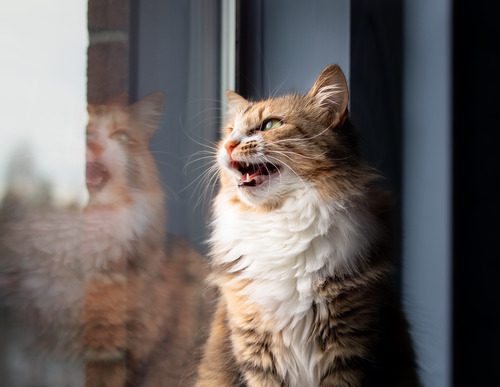If you’ve heard about outbreaks of bird flu and you share your home with a cat, you might be wondering: can cats get the bird flu? While avian influenza is most commonly associated with wild birds and poultry, there are rare cases where domestic cats have become infected. Understanding how this virus works, how it spreads, and what it could mean for your cat is important, especially in an area like Fort Lauderdale, where outdoor exposure to wild birds is more likely. In this blog, we’ll break down what bird flu is, how it affects cats, and what pet owners should know about potential risks. If you think your cat may have been exposed to an infected bird or is showing unusual symptoms, we strongly recommend calling Central Broward Animal Hospital at (954) 792-6223 or requesting an appointment.

What Is Bird Flu?
Bird flu, or avian influenza, refers to a group of viruses that primarily infect birds. The most well-known strain is H5N1, a highly pathogenic form of the virus that can cause serious illness and death in birds. Occasionally, avian influenza crosses species barriers, infecting mammals including humans and, in some documented cases, cats.
These viruses spread primarily through direct contact with infected birds, their saliva, respiratory secretions, or droppings. Wild birds, especially waterfowl, are natural carriers of avian influenza and often spread the virus without showing symptoms themselves. Poultry, on the other hand, can become very ill when infected. While the primary host remains birds, the question “can cats get the bird flu?” has gained attention in recent years as new transmission events have occurred globally.
Can Cats Get the Bird Flu?
Yes, cats can get the bird flu. There have been dozens of documented cases of cats infected with bird flu since the recent outbreak of avian influenza A (H5N1) in dairy cattle began. Prior to this, cats had already shown susceptibility to the H5N1 virus, with multiple cases tied to contact with wild birds or poultry. Cats typically become infected by:
- Eating an infected bird or undercooked/raw meat
- Coming into close contact with infected birds/bird droppings
- Being exposed to infected livestock and their environment
Not every cat exposed to an infected bird will become sick. However, those that do can develop severe symptoms, and in some cases, the illness can be fatal. The possibility of infection, even if low, raises valid concerns for cat owners in areas where bird flu outbreaks have occurred.
What Are the Symptoms of Bird Flu in Cats?
If a cat becomes infected with bird flu, the symptoms may appear quickly and can vary depending on the strain of the virus. Because the illness can progress rapidly, recognizing the signs early is critical for getting your cat medical care. Cats with bird flu may exhibit one or more of the following symptoms:
- Fever
- Labored breathing or coughing
- Lethargy or general weakness
- Loss of appetite
- Eye and nose discharge
- Vomiting or diarrhea
- Neurological signs, such as tremors or incoordination (in more severe cases)
These signs can mimic those of other respiratory illnesses or infections. If your cat spends time outdoors or has recently interacted with a wild bird or poultry, and they begin showing any of these symptoms, call (954) 792-6223 to schedule an evaluation at Central Broward Animal Hospital.
Can Bird Flu Spread from Cats to Humans?
Transmission of bird flu from cats to humans is considered extremely rare. To date, there is little evidence suggesting that infected cats can directly pass avian influenza to people. Most human infections result from direct contact with infected birds or contaminated environments, not cats.
However, because the virus continues to evolve, scientists and public health organizations are monitoring any changes in how bird flu spreads. If your cat is infected, taking extra precautions such as avoiding direct contact with their saliva or nasal secretions and washing hands after handling them can reduce any potential risks. For now, the chance of catching bird flu from a cat remains very low, especially with proper hygiene and veterinary care in place.
How Can I Reduce My Cat’s Risk?
Taking a few preventative measures can help lower the risk of exposure, especially for cats that spend time outdoors. If you live in or around Fort Lauderdale, consider these precautions to help protect your cat from possible bird flu transmission.
Tips to Limit Exposure to Bird Flu
- Keep your cat indoors as much as possible, especially during known bird flu outbreaks.
- Avoid feeding raw poultry or wild-caught birds to your cat.
- Completely cook any meat before feeding and refrain from feeding raw meat diets/treats.
- Regularly clean outdoor areas where wild birds gather.
- Contact Central Broward Animal Hospital if your cat catches or eats a bird.
Cats who remain indoors face the lowest risk. If your cat must go outside, supervising them and reducing their interaction with wild birds can make a big difference.
What to Do If You Suspect Bird Flu
If you’re wondering “can cats get the bird flu?” because your pet is showing signs of illness and had contact with birds, reach out to your veterinarian at Central Broward Animal Hospital right away. Do not attempt to treat your cat at home or wait for symptoms to worsen. Bird flu can escalate quickly, and early intervention offers the best chance of recovery. Make an appointment with Central Broward Animal Hospital by calling (954) 792-6223. Our team can assess your cat, recommend next steps, and determine if further testing is needed. While many illnesses can cause similar symptoms, identifying the underlying cause is key to helping your cat recover. Prompt, professional care is the best route.
